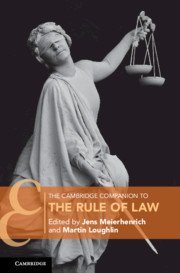Book contents
- The Cambridge Companion to the Rule of Law
- Cambridge Companions to Law
- The Cambridge Companion to the Rule of Law
- Copyright page
- Contents
- Contributors
- Part I Introduction
- Part II Histories
- Part III Moralities
- Part IV Pathologies
- 14 Thomas Hobbes and the Rule by Law Tradition
- 15 Conservative Critiques of the Rechtsstaat
- 16 Judith Shklar’s Critique of Legalism
- 17 The Frankfurt School and the Rule of Law
- 18 Critical Legal Studies and the Rule of Law
- 19 Feminist Critiques of the Rule of Law
- 20 Critical Race Theory and the Rule of Law
- Part V Trajectories
- Part VI Conclusion
- Bibliography
- Index
20 - Critical Race Theory and the Rule of Law
from Part IV - Pathologies
Published online by Cambridge University Press: 03 August 2021
- The Cambridge Companion to the Rule of Law
- Cambridge Companions to Law
- The Cambridge Companion to the Rule of Law
- Copyright page
- Contents
- Contributors
- Part I Introduction
- Part II Histories
- Part III Moralities
- Part IV Pathologies
- 14 Thomas Hobbes and the Rule by Law Tradition
- 15 Conservative Critiques of the Rechtsstaat
- 16 Judith Shklar’s Critique of Legalism
- 17 The Frankfurt School and the Rule of Law
- 18 Critical Legal Studies and the Rule of Law
- 19 Feminist Critiques of the Rule of Law
- 20 Critical Race Theory and the Rule of Law
- Part V Trajectories
- Part VI Conclusion
- Bibliography
- Index
Summary
Two things are certain about the rule of law. First, it is not the rule of men.1 Second, it is important: it protects those living under governments that are guided by it from authoritarianism, totalitarianism, and, quite possibly, “anarchy and the Hobbesian war of all against all.”2 Beyond those two certainties, however, much confusion reigns. Indeed, the rule of law is an “essentially contestable concept,” and paradigmatically so.
- Type
- Chapter
- Information
- The Cambridge Companion to the Rule of Law , pp. 357 - 374Publisher: Cambridge University PressPrint publication year: 2021

